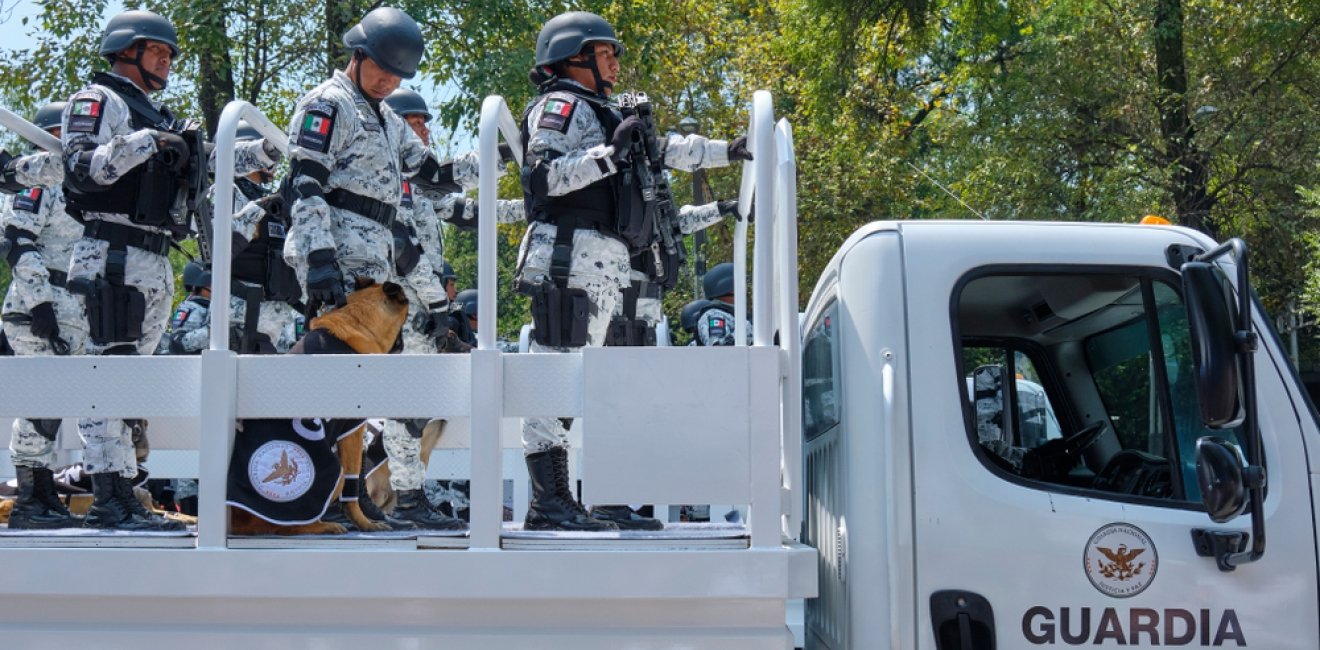
On February 5, 2024, “Constitution Day”, President López Obrador submitted 20 amendments to the Mexican Congress that seek to change 53 Constitution articles. Taken together, they will change the architecture of the Constitution to concentrate power in the hands of the president and remove institutional controls.
The ruling Morena party interpreted the 2024 election as a referendum that forced the continuation of the reforms, as it gave them the necessary majority to change the Constitution (this is debatable, but it is not the subject of this text). The reform of the judiciary has attracted public attention and triggered a fierce debate with high stakes. In the meantime, other reforms are quietly moving forward in Congress and changing the meaning of the Constitution. Such is the case with the reform of the National Guard.
Civil-military relations in Mexico are complex and have evolved over time[1]. Put simply, the military had a considerable influence on Mexican politics until the middle of the 20th century. Since the 1917 revolution and until the mid-twentieth century, every Mexican president had a military background, either active or retired. In 1946, Miguel Alemán became the first civilian president, and his government created an institutional agreement that guaranteed the subordination and loyalty of the army to civilian power, clearly limiting its role to military matters.
For decades, this agreement allowed the army, always under the command of the incumbent president, to consolidate its national security tasks to protect the state from internal threats and to carry out the "dirty work" against the growing political dissent (for example, the repression of the student movement of 1968 and the actions of the so-called “dirty war” against the guerrillas in the 1970s)[2]. At the same time, it was tasked with helping the civilian population during disasters, which earned it a very high level of public trust[3].
Throughout the democratic transition (1976-2000) and the first decades of the 21st century, the army demonstrated unwavering loyalty to the Constitution and the civilian government, even when the PRI lost the presidency in 2000. At the same time, these governments increasingly involved the military in public security tasks, mainly because of the lack of well-trained civilian police forces capable of effectively fighting organized crime.
The legal turning point was a Supreme Court ruling that established the constitutionality of the army's involvement in supporting civilian authorities. With this decision, the Supreme Court confirmed the participation of the military in public security tasks that had previously been purely civilian[4]. These tasks were expanded with the "war on drugs" proclaimed by President Calderón in 2006 and have continued ever since. During the 2018 presidential election campaign, the then-candidate López Obrador spoke out against the militarization of public security and promised to return the army to its barracks.
After he was elected president, however, López Obrador performed a U-turn. He proposed the creation of a National Guard made up of military personnel under military discipline and command. The opposition, which had the right to vote, negotiated that the National Guard should be a civilian institution with a civilian command and be subordinate to the Ministry of Public Security.
The president never accepted this decision; in practice, the National Guard was integrated by military elements. López Obrador went even further. By order of the president, the tasks of the army and navy were expanded, and they were given control of ports, airports, customs, and large public works projects — all outside the limits of the constitution, as these are all civilian tasks.
The reform proposed by López Obrador envisages the National Guard becoming a permanent public security force, made up of military and naval personnel with police training, under the authority of the Ministry of Defense. This would be the same as placing the FBI under the US Department of Defense. It also authorizes the President to use the Army, Navy, and Air Force for "public safety support functions." This measure represents a radical change to the Constitution by moving public safety (the police function), traditionally a civilian function, into the military realm.
The reform proposed by López Obrador also targets Article 129 of the Constitution, which traditionally confines the army to its quarters in times of peace. The reform removes this protection by stipulating that the army can also carry out any activity “permitted by the Constitution and the laws” in peacetime. This change removes a crucial safeguard against the military interfering in civilian affairs, which could lead to a significant shift in the balance of power.
Finally, the amendments allow the army to conduct criminal investigations through the National Guard. This is problematic in itself, but it will also upset the balance of criminal proceedings. It will be difficult for prosecutors, especially at the State level, to resist the weight of investigations conducted by the army, which have been characterized by serious human rights violations.
For decades, a clear separation between the civilian and military spheres has provided institutional stability and ensured the loyalty of the armed forces to the Constitution and the president. These reforms have upset this balance and opened the door for the military to take over tasks that traditionally belonged to the civilian government. The "militarization" now enshrined in the Constitution has potentially significant and uncertain consequences.
[1] Garza Onofre, Juan Jesús, López Ayllón, Sergio et. al. 2023. Érase un país verde olivo. Militarización y legalidad en México. México, Grano de Sal, passim
[2] See the recent report of the Truth Commission that investigated human rights violations between 1965 and 1990 and found high-ranking military commanders responsible. See Fue el Estado (1965-1990) at https://www.meh.org.mx/especial-informe-final/
[3] In the latest National Survey of Victimization and Perception of Public Security of INEGI, the Navy has 89.6% confidence and the Army 87.1%. These values have been consistently high over the years. See https://www.inegi.org.mx/programas/envipe/2023/
[4] Garza Onofre 2023, pp. 90-96
Author



